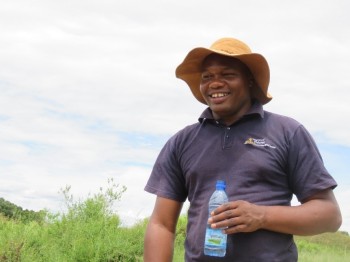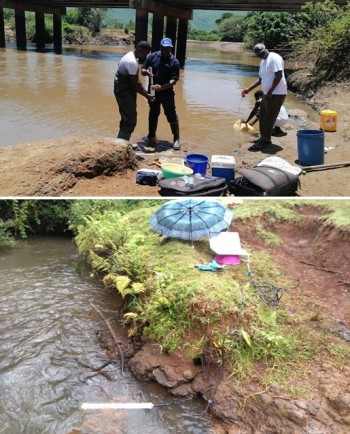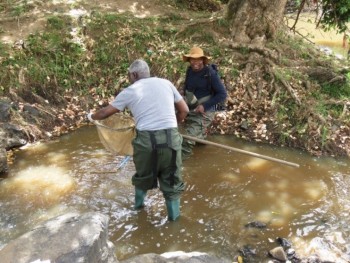The Development of a National Biomonitoring Protocol for Rivers in Kenya (The Kenya Invertebrates Scoring System - KISS) is a collaborative Multidisciplinary Research Project funded by the National Research Fund (NRF) to the tune of KES 11.9 Million. The project brings together scientists from the University of Eldoret, Egerton University and the National Museums of Kenya (NMK). Members of the research team include Dr. Frank Masese, Prof. Phillip Raburu, Prof. Boaz Kaunda-Arara, Dr. Simon Agembe, Dr. James Barasa, Dr. Geraldine Matolla and Mr. Alfred Otieno (UoE), Prof. Charles M’Erimba and Prof. Nzula Kitaka (Egerton University) and Mr. Laban Njoroge (National Museum of Kenya).
The Principal Investigator of the Project is Dr. Frank Masese, Senior Lecturer at the Department of Fisheries and Aquatic Science. Dr. Masese, an alumnus of the Department of Fisheries and Aquatic Science, holds a PhD degree on Freshwater Ecosystems (Wageningen University & Research, and IHE Delft Institute for Water Education, the Netherlands) and a Postdoctorate in Ecohydrology from the Leibniz-Institute of Freshwater Ecology and Inland Fisheries (IGB), Berlin, Germany. He has over 15 years of research experience investigating the influence of land-use change and human activities, including livestock and large wildlife populations, on water quality and the structure and functioning of riverine ecosystems in Kenya.
Dr. Masese has particular interest in biomonitoring utilizing macroinvertebrates and fishes, to which he has contributed towards the development of biomonitoring indices in streams and rivers in Kenya. Dr. Masese has worked on several projects (both with national and international collaborators) in East Africa and Europe (Austria, Albania and Germany). He has several journal publications and book chapters, and is currently on the editorial board of the journals Freshwater Biology and Frontiers in Water.
Rivers forms a very significant component of the landscape offering specific goods and services to aquatic biota and the livelihoods of riparian communities. Surface water quality is rapidly declining in Kenya, as a result of human populations growth and the resultant intensification of agriculture, urbanization, increased domestic and industrial wastewater discharges. Maintenance of water quantity and quality to meet rising demands for domestic, industrial and other use, such as irrigation, is an increasing challenge. Protection of surface waters in streams, rivers, wetlands and lakes is a prerequisite for freshwater biodiversity conservation and is universally recognized as avital element of societal wellbeing.
In order to assess the condition of surface waters, the National Environment Management Authority (NEMA) relies mostly on measurement of water quality physicochemical parameters, with the aim of maintaining them within recommended thresholds. Following this approach, wastewater discharge standards have been set for most water quality parameters and pollutants, to reduce the potential for compromising the quality of water in recipient ecosystems. Such an approach to protection of surface water is fraught with problems, mainly because levels of contaminants and parameters can vary strongly over short periods of time. This method is also expensive and lacks the integrative capacity to inform water resources managers and environmentalists about the effects of pollutants on biodiversity and overall ecological integrity of aquatic ecosystems.
Pioneering studies by Prof Phillip Raburu and his postgraduate students in the last two decades on biomonitoring of ecological integrity of riverine ecosystems in the Lake Victoria Basin prepared a firm background for the KISS Project. Aquatic organisms especially macroinvertebrates used as bioindicators have been found to be superior to chemical analyses because they integrate pollutant loads accumulated over long periods of time. Internationally the trend is to develop national or regional biological protocols for monitoring water quality and overall ecological integrity of aquatic ecosystems. Currently there is no biological criterion for assessing and monitoring the condition of aquatic ecosystems in Kenya. The KISS Project was developed to bridge this gap by developing a rapid and cost-effective biomonitoring protocol for assessing and monitoring water quality and ecological integrity of streams and rivers in Kenya.
The project is currently on its third year, and 75% of data have been collected from five major ecoregions in the country (Lake Victoria Basin, Coastal region, Mt Kenya, Rift Valley and Arid and Semi-Arid Lands (ASALs)), using standard sampling procedures. The data collected are being used to develop a national rapid bioassessment protocol, to be called the Kenya Invertebrates Scoring System (KISS), while fish data will be used to validate the protocol. Once developed, national and county water resources managers, environmentalists and other stakeholders, including students, will be trained on the use and importance of the protocol. The findings will be disseminated widely in form of reports and policy briefs to government agencies in order to guide sustainable management of water resources in the country.
The project outputs to date include:
- Supporting 3 MSc students (Augustine Sitati, Mourine Yegon and Elizabeth Wanderi) and one PhD student (Alfred Achieng) to collect data for their theses.
- Database on aquatic biodiversity and status of streams and rivers in Kenya
Characterization of streams and rivers according to biodiversity, ecoregion (ecological zone), and pollution type. - List of fishes and macroinvertebrate taxa and their tolerance to water quality and habitat degradation in Kenya.
- Manual on the use and application of the bioassessment protocol.
Research articles that have already been published or are in submission/preparation include:
Published articles
- Achieng A.O, Masese FO & Kaunda-Arara, B. (2020). Fish assemblages and size-spectra variation among rivers of Lake Victoria Basin, Kenya. Ecological Indicators, 118, 106745.
- Masese FO, Achieng AO, Raburu PO, Lawrence T, Ives JT, Nyamweya C & Kaunda-Arara B. (2020). Distribution patterns and diversity of riverine fishes of the Lake Victoria Basin, Kenya. International Review of Hydrobiology, doi:10.1002/iroh.202002039
- Masese FO, Achieng’ AO, O’brien GC, & McClain ME. (2020). Macroinvertebrate taxa display increased fidelity to preferred biotopes among disturbed sites in a hydrologically variable tropical river. Hydrobiologia, doi:10.1007/s10750-020-04437-1
- Achieng’ AO, Masese FO, Coffey TJ, Raburu PO, Agembe SW, Febria CM, Kaunda-Arara B. Physicochemical assessment of stream health of Afrotropical rivers using fish assemblages: A case of the Lake Vitoria Basin, Kenya. Frontiers in Water. DOI:10.3389/frwa.2020620704
Articles in submission and in preparation
- Sitati A, Raburu PO & Masese FO. Functional organization of macroinvertebrates in response to land use in the Nzoia River. Limnologica. In Revision
- Sitati A, Masese FO & Raburu PO. Functional organization of macroinvertebrate assemblages as surrogates of ecosystem attributes in Afrotropical streams. Ecological Indicators. In Review
- Nakangu NF, Barasa JE, Matolla GK, Riziki JW, Molongaibalu M, Masese FO. Food composition and condition factor in Labeo victorianus in rivers of Lake Victoria Basin, Kenya. African Zoology. In Review
- Masese FO, Sitati A, Yegon MJ, Achieng’ AO, Agembe SW, Barasa JE, Matolla GK, Raburu PO, Kaunda-Arara B. Development of a flow sensitive index of biotic integrity for assessing ecological condition of highly hydrologically variable tropical rivers. In preparation.
- Sitati A, Yegon MJ, Achieng’ AO, Agembe SW, Barasa JE, Matolla GK, Raburu PO, Kaunda-Arara B, Masese FO. Structural organization of macroinvertebrates in response to catchment land use in the Nzoia River, Kenya. In preparation.
- Masese FO, Achieng’ AO, Agembe SW, Sitati A, Barasa JE, Matolla GK, Raburu PO, Kaunda-Arara B. Influence of multiple stressors on fish assemblages in a dry-wet tropical savanna river. In preparation.
- Masese FO, Achieng’ AO, Agembe SW, Sitati A, Mourine Yegon, Barasa JE, Matolla GK, Raburu PO, Kaunda-Arara B. Influence of multiple stressors on macroinvertebrate communities in a dry-wet tropical savanna river. In preparation.
In a nutshell, the project contributes to the attainment of Vison 2030 and Sustainable Development Goals on water provision, conservation of water resources, and protection of the environment. On successful completion, the project will provide the first-ever protocol for biomonitoring water quality in Kenyan rivers and streams.



